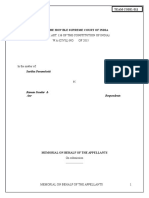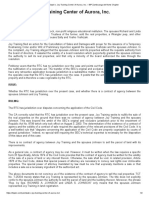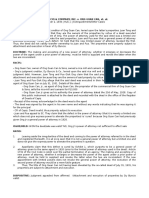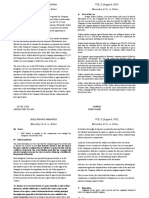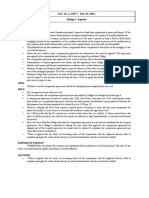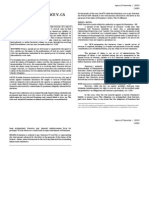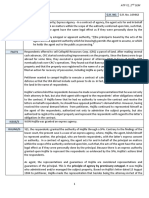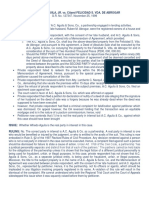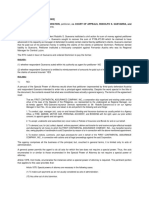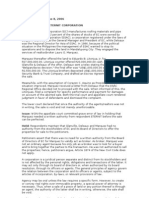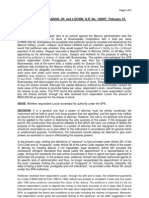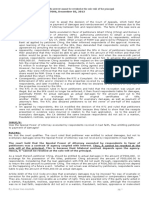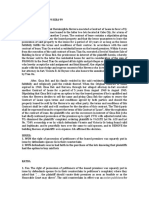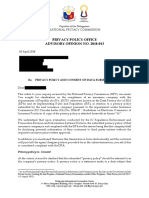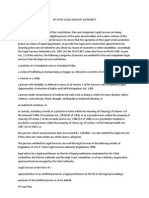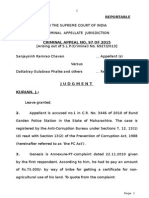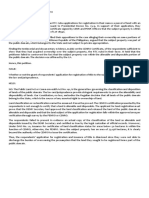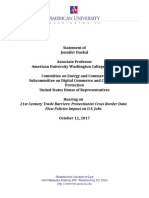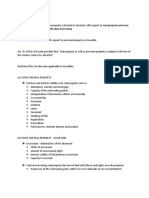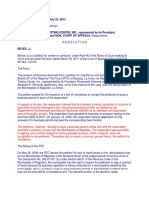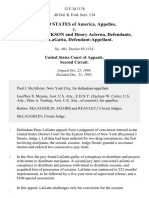0 ratings0% found this document useful (0 votes)
456 viewsBuncio and Co V Ong Guan
Buncio and Co V Ong Guan
Uploaded by
Abraham GuiyabThis case involves a dispute over ownership of two properties between a judgment creditor and defendants who claim ownership through a deed of sale. The Supreme Court ruled the deed of sale was invalid because the agent who executed it did not have the appropriate power of attorney to alienate the properties. Specifically, a limited power of attorney given in 1931 did not revoke a general power from 1920, so the agent exceeded his authority in the sale. As such, the properties remained subject to execution by the judgment creditor.
Copyright:
© All Rights Reserved
Available Formats
Download as DOCX, PDF, TXT or read online from Scribd
Buncio and Co V Ong Guan
Buncio and Co V Ong Guan
Uploaded by
Abraham Guiyab0 ratings0% found this document useful (0 votes)
456 views1 pageThis case involves a dispute over ownership of two properties between a judgment creditor and defendants who claim ownership through a deed of sale. The Supreme Court ruled the deed of sale was invalid because the agent who executed it did not have the appropriate power of attorney to alienate the properties. Specifically, a limited power of attorney given in 1931 did not revoke a general power from 1920, so the agent exceeded his authority in the sale. As such, the properties remained subject to execution by the judgment creditor.
Original Description:
blah
Original Title
Buncio and Co v Ong Guan
Copyright
© © All Rights Reserved
Available Formats
DOCX, PDF, TXT or read online from Scribd
Share this document
Did you find this document useful?
Is this content inappropriate?
This case involves a dispute over ownership of two properties between a judgment creditor and defendants who claim ownership through a deed of sale. The Supreme Court ruled the deed of sale was invalid because the agent who executed it did not have the appropriate power of attorney to alienate the properties. Specifically, a limited power of attorney given in 1931 did not revoke a general power from 1920, so the agent exceeded his authority in the sale. As such, the properties remained subject to execution by the judgment creditor.
Copyright:
© All Rights Reserved
Available Formats
Download as DOCX, PDF, TXT or read online from Scribd
Download as docx, pdf, or txt
0 ratings0% found this document useful (0 votes)
456 views1 pageBuncio and Co V Ong Guan
Buncio and Co V Ong Guan
Uploaded by
Abraham GuiyabThis case involves a dispute over ownership of two properties between a judgment creditor and defendants who claim ownership through a deed of sale. The Supreme Court ruled the deed of sale was invalid because the agent who executed it did not have the appropriate power of attorney to alienate the properties. Specifically, a limited power of attorney given in 1931 did not revoke a general power from 1920, so the agent exceeded his authority in the sale. As such, the properties remained subject to execution by the judgment creditor.
Copyright:
© All Rights Reserved
Available Formats
Download as DOCX, PDF, TXT or read online from Scribd
Download as docx, pdf, or txt
You are on page 1of 1
G.R. No.
L-40681 October 2, 1934
DY BUNCIO & COMPANY, INC., plaintiff-appelle,
vs.
ONG GUAN CAN, ET AL., defendants.
JUAN TONG and PUA GIOK ENG, appellants.
NOTE: THIS CASE WAS PROMULGATED IN 1934, SO THE APPLICABLE CIVIL CODE IS NOT THE PRESENT ONE
OF 1950, AND THE ARTICLES BELOW DONT REFER TO THE NCC. BUT ITS THE DOCTRINE THAT MATTERS
Facts:
This suit involves ownership over two particular pieces of property in Dao, Province of Capiz. The properties
in question are a rice mill and a camarin (a type of chapel). The contention is that the property belongs to its
judgment debtor, Ong Guan Can, while defendants Juan Tong and Pua Giok Eng claim as owner and lessee of
the owner by virtue of a deed dated July 31, 1931, by Ong Guan Can, Jr.
After trial the CFI of Capiz held that the deed was invalid and that the property was subject to the
execution which has been levied on said properties by the judgment creditor of the owner. Defendants Juan
Tong and Pua Giok bring this appeal and insist that the deed of the 31st of July, 1931, is valid.
The first recital of the deed is that Ong Guan Can, Jr., as agent of Ong Guan Can, the proprietor of the
commercial firm of Ong Guan Can & Sons, sells the rice-mill and camarin for P13,000 and gives as his
authority a particular power of attorney. However, he (Jr.) signed it in his name without any mention of the
principal. The receipt of money was also addressed to him.
Aside from this irregularity, the Supreme Court ruled that it was immediately apparent that the power of
attorney was a limited one, and not a specific one which would include the power to alienate.
Appellants claim that this defect is cured by what is supposedly a general power of attorney given to the
same agent in 1920. Article 1732 of the Civil Code is silent over the partial termination of an agency. The
making and accepting of a new power of attorney, whether it enlarges or decreases the power of the agent
under a prior power of attorney, must be held to supplant and revoke the latter when the two are
inconsistent. If the new appointment with limited powers does not revoke the general power of attorney,
the execution of the second power of attorney would be a mere futile gesture.
ISSUE: WAS THE SALE VALID?
HELD: No, there was no appropriate power of attorney. Hence it may be the subject of execution.
What to take away from this case: When a new power of attorney is accepted, and it is inconsistent with an
earlier one, it revokes the earlier one.
You might also like
- Petitioner (K.M. NANAVATI Vs - State of Maharastra)Document14 pagesPetitioner (K.M. NANAVATI Vs - State of Maharastra)Pulkit Channan67% (9)
- Orient Air Vs Court of Appeals Case Digest On AgencyDocument1 pageOrient Air Vs Court of Appeals Case Digest On Agencykikhay1180% (5)
- Rallos v. Felix Go Chan & SonsDocument2 pagesRallos v. Felix Go Chan & Sonsdelayinggratification100% (4)
- Digest of Litonjua, Jr. v. Eternit Corp. (G.R. No. 144805)Document2 pagesDigest of Litonjua, Jr. v. Eternit Corp. (G.R. No. 144805)Rafael Pangilinan100% (8)
- ANMCC2016 PetitionerDocument32 pagesANMCC2016 Petitionerkarti_am60% (5)
- Garcia V ManzanoDocument1 pageGarcia V Manzanosmtm06No ratings yet
- International Exchange Bank vs. BrionesDocument3 pagesInternational Exchange Bank vs. BrionesLupin the Third80% (10)
- Bordador V LuzDocument3 pagesBordador V Luzdarwin polido100% (1)
- Sally Yoshizaki Vs Joy Trining Center of Aurora, Inc., G.R. No. 174978 DigestDocument2 pagesSally Yoshizaki Vs Joy Trining Center of Aurora, Inc., G.R. No. 174978 DigestKarmille Buenacosa100% (2)
- Angeles vs. PNR DigestDocument1 pageAngeles vs. PNR Digestmansikiabo67% (3)
- (Digest) Angeles V PNRDocument2 pages(Digest) Angeles V PNRGRNo ratings yet
- Bpi V de Coster - DigestDocument3 pagesBpi V de Coster - DigestKarez MartinNo ratings yet
- 340 - Yokishazi Vs Joy Training CenterDocument2 pages340 - Yokishazi Vs Joy Training CenterTaz Tanggol Tabao-SumpinganNo ratings yet
- 14-ATP-Escueta vs. LimDocument2 pages14-ATP-Escueta vs. LimJoesil DianneNo ratings yet
- Respondent Ail Moot 2013Document24 pagesRespondent Ail Moot 2013Ashutosh KumarNo ratings yet
- St. Paul's Motion To Dismiss and OrderDocument5 pagesSt. Paul's Motion To Dismiss and OrderKentFaulkNo ratings yet
- Dy Buncio v. Ong Guan CanDocument2 pagesDy Buncio v. Ong Guan CanKatrina Dino-Poblete100% (1)
- 83 Dy Buncio v. Ong Guan Gan, 60 Phil. 696 (1934)Document3 pages83 Dy Buncio v. Ong Guan Gan, 60 Phil. 696 (1934)Carie LawyerrNo ratings yet
- Domingo Vs DomingoDocument1 pageDomingo Vs DomingodmcfloresNo ratings yet
- Macondray & Co. vs. Sellner DigestDocument2 pagesMacondray & Co. vs. Sellner Digestchan.aNo ratings yet
- (INLAND REALTY INVESTMENT SERVICE, INC V CADocument1 page(INLAND REALTY INVESTMENT SERVICE, INC V CAAbigail Tolabing100% (2)
- International Films v. Lyric Film - DIGESTDocument2 pagesInternational Films v. Lyric Film - DIGESTkathrynmaydevezaNo ratings yet
- GOLD STAR MINING V JIMENADocument3 pagesGOLD STAR MINING V JIMENA123abc456def100% (1)
- Rural Bank of Bombon v. Court of AppealsDocument2 pagesRural Bank of Bombon v. Court of AppealsJDR JDRNo ratings yet
- ANTONIO PRATS V COURT OF APPEALSDocument2 pagesANTONIO PRATS V COURT OF APPEALSRani MaeNo ratings yet
- Valera v. Velasco Case DigestDocument3 pagesValera v. Velasco Case DigestNinya SaquilabonNo ratings yet
- Bedia vs. White / AgencyDocument3 pagesBedia vs. White / AgencyMaria Francheska GarciaNo ratings yet
- G.R. No. L-18377. Dec 29, 1962.: Duñgo v. LopenaDocument1 pageG.R. No. L-18377. Dec 29, 1962.: Duñgo v. LopenaHazel P.100% (1)
- (AGENCY) (Dominion Insurance v. CA)Document2 pages(AGENCY) (Dominion Insurance v. CA)Alyanna Apacible100% (3)
- GR No. 82978Document1 pageGR No. 82978shezeharadeyahoocomNo ratings yet
- Case Title G.R. NO. DoctrineDocument2 pagesCase Title G.R. NO. Doctrinefledpengel100% (1)
- Manila Memorial Park Cemetery v. Linsangan - DigestDocument2 pagesManila Memorial Park Cemetery v. Linsangan - Digestcmv mendoza100% (1)
- 08 Aguila Vs CADocument1 page08 Aguila Vs CANichole LanuzaNo ratings yet
- Coleongco v. Claparols (1964)Document2 pagesColeongco v. Claparols (1964)Jenny Mary DagunNo ratings yet
- #Dominion Insurance V CADocument2 pages#Dominion Insurance V CAKareen Baucan100% (1)
- Rallos Vs YangcoDocument2 pagesRallos Vs YangcoRyanNo ratings yet
- Pasno Vs Ravina DigestDocument1 pagePasno Vs Ravina DigestMary Kaye ValerioNo ratings yet
- Litonjua JR V EternitDocument2 pagesLitonjua JR V Eternitaphrodatee100% (6)
- Digest Bordador v. LuzDocument1 pageDigest Bordador v. LuzGR100% (1)
- (AGENCY) (Tuason v. Orozco)Document1 page(AGENCY) (Tuason v. Orozco)Alyanna Apacible100% (1)
- Diolosa vs. Court of Appeals - CDDocument1 pageDiolosa vs. Court of Appeals - CDmenforever100% (2)
- Olaguer vs. Parugganan and Locsin Case DigestDocument1 pageOlaguer vs. Parugganan and Locsin Case DigestmansikiaboNo ratings yet
- Ching vs. Bantolo, G.R. No. 177086 - Case Digest (Contract of Agency Coupled With Interest)Document2 pagesChing vs. Bantolo, G.R. No. 177086 - Case Digest (Contract of Agency Coupled With Interest)Alena Icao-AnotadoNo ratings yet
- Municipal Council of Iloilo V EvangelistaDocument2 pagesMunicipal Council of Iloilo V Evangelistasmtm06100% (1)
- Shell Co. v. Firemen's Insurance of Newark, 100 Phil. 757 (1957)Document2 pagesShell Co. v. Firemen's Insurance of Newark, 100 Phil. 757 (1957)Kent Ugalde100% (1)
- 47 CMS Logging v. CADocument2 pages47 CMS Logging v. CAAnthony ChoiNo ratings yet
- Heirs of Candelaria v. RomeroDocument1 pageHeirs of Candelaria v. RomeroDGDelfinNo ratings yet
- Dominion Insurance Corp. v. Court of AppealsDocument3 pagesDominion Insurance Corp. v. Court of AppealsLoruel Kyle Nadayag100% (1)
- Danon vs. Brimo & Co DDocument3 pagesDanon vs. Brimo & Co DJazem AnsamaNo ratings yet
- Prudential Bank V CADocument1 pagePrudential Bank V CAAnonymous AUdGvYNo ratings yet
- Cervantes V CA DigestDocument2 pagesCervantes V CA DigestKareen BaucanNo ratings yet
- Case Digest - Harry E. Keeler Electric Co. Vs Rodriguez, 44 Phil 19Document2 pagesCase Digest - Harry E. Keeler Electric Co. Vs Rodriguez, 44 Phil 19Maxene Pigtain100% (2)
- Uy v. Court of AppealsDocument2 pagesUy v. Court of AppealsJoyce Anne Cruz100% (1)
- Herrera VS Luy Kim GuanDocument3 pagesHerrera VS Luy Kim GuanElla Marcelo100% (1)
- Del Rosario V. Abad 104 PHIL 648 (1958) FactsDocument2 pagesDel Rosario V. Abad 104 PHIL 648 (1958) FactsVian O.No ratings yet
- Manotok Brothers Inc. v. CADocument2 pagesManotok Brothers Inc. v. CAdelayinggratificationNo ratings yet
- Domingo Vs DomingoDocument2 pagesDomingo Vs DomingoJani Misterio100% (1)
- Macke V Camps DigestDocument1 pageMacke V Camps DigestBarrrMaidenNo ratings yet
- CHUA vs. IACDocument2 pagesCHUA vs. IACNivra Lyn EmpialesNo ratings yet
- Green Valley Vs IACDocument1 pageGreen Valley Vs IACFai Meile100% (1)
- Ramon v. CaoibesDocument2 pagesRamon v. CaoibesCamille BritanicoNo ratings yet
- Dy Buncio V Ong Guan CanDocument1 pageDy Buncio V Ong Guan CangabbyborNo ratings yet
- de Buncio and Co. v. Ong GuanDocument1 pagede Buncio and Co. v. Ong GuanSheila ConsulNo ratings yet
- de Buncio & Co. Vs Ong Guan GanDocument2 pagesde Buncio & Co. Vs Ong Guan GanZahraMinaNo ratings yet
- WTO Working ProceduresDocument29 pagesWTO Working ProceduresAbraham GuiyabNo ratings yet
- Notice: Bulletin Date Subject Clarification/Details No. MatterDocument5 pagesNotice: Bulletin Date Subject Clarification/Details No. MatterAbraham GuiyabNo ratings yet
- Guiyab Compet Bar Reviewer UpdatedDocument35 pagesGuiyab Compet Bar Reviewer UpdatedAbraham GuiyabNo ratings yet
- Privacy Policy Office Advisory Opinion No. 2018-013Document3 pagesPrivacy Policy Office Advisory Opinion No. 2018-013Abraham GuiyabNo ratings yet
- Visit Letter BITRDocument2 pagesVisit Letter BITRAbraham GuiyabNo ratings yet
- Olicy: Perceptions and Laws On Unfair Trade Practices in The PhilippinesDocument8 pagesOlicy: Perceptions and Laws On Unfair Trade Practices in The PhilippinesAbraham GuiyabNo ratings yet
- Merger Control Survey 2015: Lead Contributors Ian Giles and Marc WahaDocument4 pagesMerger Control Survey 2015: Lead Contributors Ian Giles and Marc WahaAbraham GuiyabNo ratings yet
- 30 Wentz v. FincherDocument1 page30 Wentz v. FincherAbraham GuiyabNo ratings yet
- Car Cool Philippines Vs UshioDocument3 pagesCar Cool Philippines Vs UshioAbraham GuiyabNo ratings yet
- Gsis V CA DigestDocument1 pageGsis V CA DigestAbraham GuiyabNo ratings yet
- Agrarian Law OutlineDocument5 pagesAgrarian Law OutlineAbraham GuiyabNo ratings yet
- Ayson v. Spouses Paragas (Guiyab)Document1 pageAyson v. Spouses Paragas (Guiyab)Abraham GuiyabNo ratings yet
- Article 35 - Legal CapacityDocument9 pagesArticle 35 - Legal CapacitySator LawNo ratings yet
- MSU SettlementDocument16 pagesMSU SettlementDeadspinNo ratings yet
- Simon Vs ChanDocument3 pagesSimon Vs ChankimNo ratings yet
- Cadet Activities Consent FormDocument1 pageCadet Activities Consent Formrobby_dicksonNo ratings yet
- Bar Questions 2006Document4 pagesBar Questions 2006jstin_jstinNo ratings yet
- Canezo v. RohasDocument22 pagesCanezo v. RohasElmer Dela CruzNo ratings yet
- Judicial Process: Justice in Adapting To Change: Submitted To-Dr. Eqbal HussainDocument17 pagesJudicial Process: Justice in Adapting To Change: Submitted To-Dr. Eqbal HussainShardendu PandeyNo ratings yet
- AP State Legal Services AuthorityDocument3 pagesAP State Legal Services Authoritymrraee4729No ratings yet
- About Billy Zachery EarleyDocument4 pagesAbout Billy Zachery EarleyBilly EarleyNo ratings yet
- Sanction Shouldn't Be Granted For Vexatious ProsecutionDocument20 pagesSanction Shouldn't Be Granted For Vexatious ProsecutionLive Law100% (1)
- Racial ProfilingDocument12 pagesRacial Profilingserbi1962No ratings yet
- Republic v. Jaralve - DigestDocument1 pageRepublic v. Jaralve - DigestKate GaroNo ratings yet
- Cruz Vs DENRDocument6 pagesCruz Vs DENRBeverly LegaspiNo ratings yet
- 21st Century Trade Barriers: Protectionist Cross Border Data Flow Policies Impact On U.S. JobsDocument10 pages21st Century Trade Barriers: Protectionist Cross Border Data Flow Policies Impact On U.S. JobsJust SecurityNo ratings yet
- Pemeriksaan fis-WPS OfficeDocument23 pagesPemeriksaan fis-WPS OfficeDeva NatarummandaNo ratings yet
- Neypes Vs CA DigestDocument2 pagesNeypes Vs CA DigestMoon Beams100% (2)
- Property Conflict of LawsDocument3 pagesProperty Conflict of LawsWillam MontalbanNo ratings yet
- Teotico v. City of ManilaDocument2 pagesTeotico v. City of ManilaGR100% (2)
- Between:: Commented (C&G1) : We Note That TheDocument12 pagesBetween:: Commented (C&G1) : We Note That TheRafael JuicoNo ratings yet
- Rimando Vs Naguilian Emmission Testing CenterDocument4 pagesRimando Vs Naguilian Emmission Testing CenterDeborah Grace ApiladoNo ratings yet
- Jowel Sales Vs Cyril SabinoDocument1 pageJowel Sales Vs Cyril SabinoMae BungabongNo ratings yet
- Serial NO. Case Name Facts DecisionDocument33 pagesSerial NO. Case Name Facts DecisionShweta TomarNo ratings yet
- Country Compendium: A Companion To The English Style GuideDocument6 pagesCountry Compendium: A Companion To The English Style GuideJohn BondNo ratings yet
- Perjurious Testimony Regarding Prior Criminal Conviction by Judge Peter J. McBrien at the Commission on Judicial Performance: Whistleblower Leaked Court Records from the California Commission on Judicial Performance Prosecution of Hon. Peter McBrien Sacramento County Superior Court - Judge Steve White - Judge Laurie Earl - Judge Robert Hight - Judge James Mize - Judge Jaime Roman - Judge Matthew Gary Sacramento Superior Court -California Supreme Court Justice Leondra R. Kruger, Justice Mariano-Florentino Cuellar, Justice Goodwin H. Liu, Justice Carol A. Corrigan, Justice Ming W. Chin, Justice Kathryn M. Werdegar, Justice Tani G. Cantil-Sakauye - Victoria Henley Director-Chief Counsel CJPDocument24 pagesPerjurious Testimony Regarding Prior Criminal Conviction by Judge Peter J. McBrien at the Commission on Judicial Performance: Whistleblower Leaked Court Records from the California Commission on Judicial Performance Prosecution of Hon. Peter McBrien Sacramento County Superior Court - Judge Steve White - Judge Laurie Earl - Judge Robert Hight - Judge James Mize - Judge Jaime Roman - Judge Matthew Gary Sacramento Superior Court -California Supreme Court Justice Leondra R. Kruger, Justice Mariano-Florentino Cuellar, Justice Goodwin H. Liu, Justice Carol A. Corrigan, Justice Ming W. Chin, Justice Kathryn M. Werdegar, Justice Tani G. Cantil-Sakauye - Victoria Henley Director-Chief Counsel CJPCalifornia Judicial Branch News Service - Investigative Reporting Source Material & Story Ideas100% (1)
- United States v. Stephen B. Zackson and Henry Acierno, Peter Lagatta, 12 F.3d 1178, 2d Cir. (1993)Document13 pagesUnited States v. Stephen B. Zackson and Henry Acierno, Peter Lagatta, 12 F.3d 1178, 2d Cir. (1993)Scribd Government DocsNo ratings yet
- Clarin V RulonaDocument3 pagesClarin V RulonaYasser MambuayNo ratings yet




